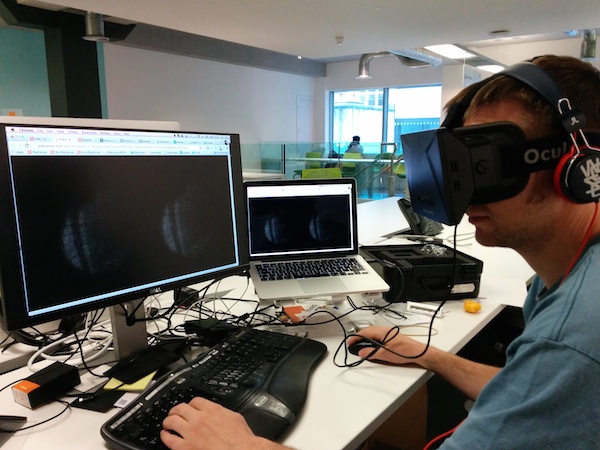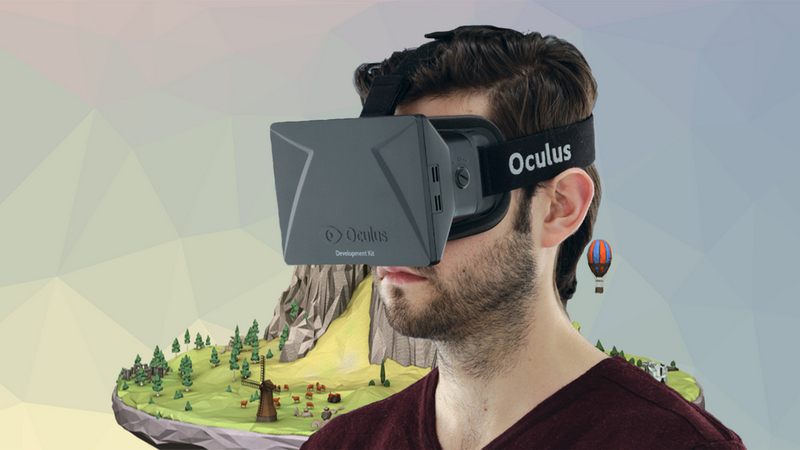Virtual Reality and the future of Web Based Gaming
On Thursday 19th of June we will be showcasing some of our recent work with the amazing and exciting Oculus Rift Development Kit. In the build up and anticipation to this event we hope to convey why Virtual Reality and revolutionary hardware from Oculus VR are set to be a part of our future at PlayCanvas. Playing a game in VR is one thing. Making a game in VR...now that really is the future.
What is the Oculus Rift?
Developed first by then 18 year old Palmer Luckey, two evolutions of its development kit amongst other improvements makes it arguably the most promising virtual reality system to date. The Oculus Rift is a low latency,head-mounted display that receives two independently rendered images to a screen to be viewed through stereoscope lenses.
Why Virtual reality?
Many virtual reality experiences target immersion, where users interaction can open the door to a reality (even if only partially) that is not their own. However the technology behind the Oculus lets the user into a much deeper experience. Where extreme latency and narrow fields of vision have prevented previous Virtual Reality technologies from being immersive, they have often proved successful in creating nausea. As humans are sensitive to latencies as low as 20 milliseconds it is important for the technology in question to be as precise and fast as possible.
Usually leaving users craning necks and grabbing thin air in disbelief, the Oculus takes over 1000 readings per second and so far is effective enough to trick the mind and simulate a physical presence. The VR industry is now closer to 'telexistance' than ever before. Mark Zuckerberg, the current owner of the technology (following an acquisition worth $2 billion by Facebook) described its potential, exclaiming "Imagine enjoying a courtside seat at a game, studying in a classroom of students and teachers all over the world, or consulting with a doctor face-to-face—just by putting on goggles in your home.”. The Oculus promises that in (hopefully few) years to come, gamers may be able to act and react naturally in what is still a virtual setting.
The Oculus Rift and PlayCanvas

Oculus Rift support coming soon to PlayCanvas
Imagine a future where you open your Internet browser, select a VR ready online game, enable your Oculus headset and transport yourself into the game immediately. Mind blowing? Potentially yes. This is why we here at PlayCanvas are committed to intertwining the paths of both WebGL and HTML5 technologies with the capabilities of the Oculus Rift. It's crazy to think that VR games could be played and developed by simply opening your favorite web browser.
Firefox are already thinking about VR on the web. Chrome are too. Be sure that when VR support fully comes to the web, PlayCanvas will be ready to help you get there faster. Game Developer's have so many challenges to overcome while developing their game that adding VR (or Head-Mounted Display) support could become just another one of the features that you'd love to try but never quite have time to do. However, using PlayCanvas it's simple. Just drop the OculusCamera script onto your camera and we'll do all the magic to make your game render ready for the headset.
Hyper-realistic gaming experiences should not be limited to core gaming platforms. When web-based gaming can involve products like the Oculus we're opening up an whole new class of immersive gaming experiences. The best of the features of the web; low-friction, accessible and shareable; with the best features of the Oculus, immersive, high-end experiences. It's brave new world!
Dave Evans (CTO at PlayCanvas) will be showcasing some of our work with the Oculus Rift on June 19th at the Scenario Bar. Check out the Event link here and maybe we will see you there!
